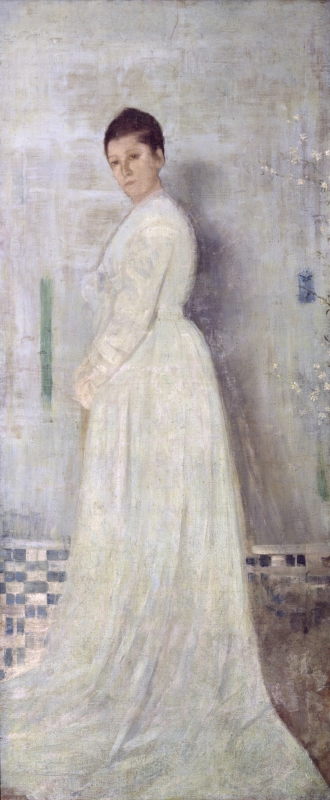Harmony in White and Blue may date from between 1872 and 1874, but it is not certain that, in its present form, it was painted or signed by Whistler. 1 This date is principally based on a certain similarity in dress and signature to Whistler's Arrangement in Black, No. 2: Portrait of Mrs Louis Huth [YMSM 125], to the matting in Harmony in Grey and Peach Colour [YMSM 131], and flowers in Harmony in Grey and Green: Miss Cicely Alexander [YMSM 129].
The butterfly signature in Harmony in White and Blue is faint and may date from an early stage in the painting: it has clearly been rubbed or scraped down. It is just possible that this butterfly was on the original painting but it would seem odd, if Whistler was scraping down the picture, that he would leave the signature visible at all. The butterfly appears to be on a rectangular cartouche or field, but that does not have a precise outline: the repainted background has been painted up to and around a thinly painted rectangular area. The butterfly itself appears to have been lightly retouched, and there are some small meaningless brushstrokes around the area of the cartouche.
The painting could have been among canvases 'more or less destroyed' according to Thomas Robert Way (1861-1913), by Whistler, at the time of his bankruptcy in 1879. 2
It could have been scraped down by the artist at the time of his bankruptcy, rolled up, and later finally repaired and reworked by another hand, by 1910 (see TECHNIQUE and HISTORY; see also Arrangement in Flesh Colour and Grey: The Chinese Screen [YMSM 051]). However, what is now visible does not, on the whole, look like Whistler's technique. It is possible that it is the work of another artist, working on a composition and in a style influenced by Whistler. A very likely candidate is Walter Greaves (1846-1930), who undoubtedly worked on restoring a number of canvases mistakenly attributed to Whistler in 1910.
Last updated: 21st October 2020 by Margaret







